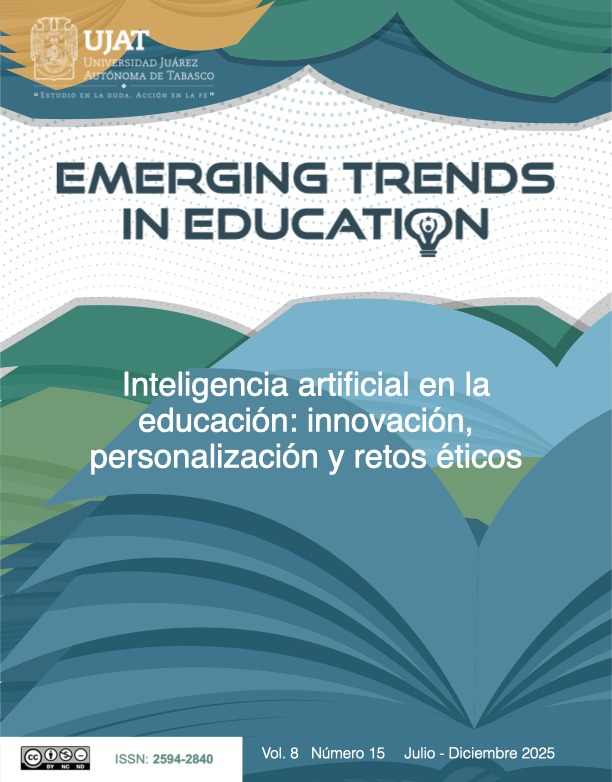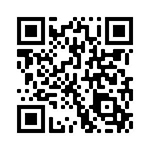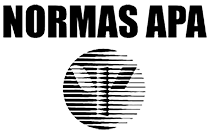Personalized Learning and Personal Learning Environments in the Era of Generative AI: Theoretical and conceptual notes
DOI:
https://doi.org/10.19136/etie.v8n15.6341Keywords:
Learning Enviroments, Artificial Intelligence, Personalized learningAbstract
In a complex and changing world, characterized by massive access to information and the use of emerging technologies such as Generative Artificial Intelligence (GAI), it is crucial to review some of the theoretical foundations of learning personalization. This article examines personalized learning through the use of GAI in the context of Personal Learning Environments (PLE), addressing some theoretical and conceptual bases. Throughout the text, it is discussed how theoretical approaches support the adaptation of teaching to the characteristics of the student, emphasizing the importance of designing educational experiences that promote autonomy and self-regulation. Likewise, the role of the interaction between the student and digital environments in the configuration of personalized training paths is highlighted. Finally, the relevance of the concept of learning personalization in the context of current education is reflected upon.
References
Adell, J., y Castañeda, L. J. (2010). Los Entornos Personales de Aprendizaje (PLEs): una nueva manera de entender el aprendizaje. En V. Roig & M. Fiorucci (Eds.), Claves para la investigación en innovación y calidad educativas. La integración de las Tecnologías de la Información y la Comunicación y la Interculturalidad en las aulas. Strumenti di ricerca per l’innovazione e la qualità in ambito educativo. Marfil.
Aparicio-Gómez, O.Y. (2024). Innovación educativa con sistemas de aprendizaje adaptativo impulsados por Inteligencia Artificial. Revista Internacional de Pedagogía e Innovación Educativa. 4 (2), 343- 363. https://doi.org/10.51660/ripie42222
Attwell, G. (2007). Personal Learning Environments - the future of eLearning ?, eLearning Papers, 2(1), 1–8. https://bit.ly/3Icbs7M
Baig, M., Boned, P., González-Ceballos, I., & Esteban-Guitart, M. (2023). Artefactos identitarios multimodales 2.0 como mecanismo de personalización del aprendizaje en educación superior. Un estudio cualitativo. RIED-Revista Iberoamericana de Educación a Distancia, 26(2), 27–44. https://doi.org/10.5944/ried.26.2.36227
Bermeo - Paucar, J., Pérez- Martínez , L., y Villalobos- Autúnez, J.V. (2024). La Inteligencia Artificial Educativa. "Quinta ola", Conectivismo e Innovación Digital Pedagógica. Educational Artificial Intelligence. “Fifth wave”, Conectivism and Pedagogical Digital Innovation.]. European Public & Social Innovation Review, 9, 1-17. https://doi.org/10.31637/epsir-2024-1599
Bidarra, J., y Sousa, N. (2020). Implementing Mobile Learning Within Personal Learning Environments: A Study of Two Online Courses. International Review of Research in Open and Distance Learning, 21(4), 182–198. https://doi.org/10.19173/IRRODL.V21I4.4891
Calle, G. Y., y Sánchez, J. A. (2017). Influencia de los entornos personales de aprendizaje en las habilidades metacognitivas asociadas a la escritura digital. Entramado, 13(1), 128–146. https://bit.ly/4bO3HSN
Carrasco-Sáez, J. L., Butter, M. C., Badilla-Quintana, M. G., Pérez, L. J., y Farfán, J. M. (2019). Sociological importance and validation of a questionnaire for the sustainability of personal learning environments (PLE) in 8th grade students of the Biobío Region in Chile. Sustainability (Switzerland), 11(5). https://doi.org/10.3390/su11051301
Castaño, R, A. (2024). Impacto de la inteligencia artificial generativa en la educación superior: un estudio comparativo. Revista de la UNAN-Managua, Extensión Universitaria, 7 (12). 95- 110. https://doi.org/10.5377/recoso.v7i12.19650
Chulde-Zhirve, E. H., Suarez-Flores, V. A., Simbaña-Lincango, A., Chisaguano-Tapia, J. N., y Espinosa-Aguirre, W. E. (2024). Estrategias para implementar la personalización del aprendizaje en aulas activas. Revista Científica Retos De La Ciencia, 1(4), 99–114. https://doi.org/10.53877/rc.8.19e.202409.9
Cisneros, E., Nevárez, R., Farez, A., y Torres, R. (2024). Uso de la inteligencia artificial en la personalización del aprendizaje. Conocimiento Global, 9(1), 75-83. https://doi.org/10.70165/cglobal.v9i1.339
Coll, C., Engel, A., Saz, A., y Bustos, A. (2014). Personal learning environments: design and use /Los entornos personales de aprendizaje en la educación superior: del diseño al uso. Cultura y Educación, 26(4), 775–801. https://doi.org/10.1080/11356405.2014.985935
Dabbagh, N., y Castaneda, L. (2020). The PLE as a framework for developing agency in lifelong learning. Educational Technology Research and Development, 68(6), 3041–3055. https://doi.org/10.1007/s11423-020-09831-z
Dabbagh, N., y Fake, H. (2017). College students’ perceptions of personal learning environments through the lens of digital tools, processes and spaces. Journal of New Approaches in Educational Research, 6(1), 28–36. https://doi.org/10.7821/naer.2017.1.215
De Araujo, A., Papadopoulos, P. M., McKenney, S. y de John, T. (2023). Automated coding of student shats, a trnas- topic and language approach. Computers and Education: Artificial Intelligence, 4. 100123. https://doi.org/10.1016/j.caeai.2023.100123
De Moura, E,O y de Souza, M. (2020). Sociomateriality: Theories, methodology, and practice. Canadian Journal of Administrative Sciences, 37 (3). 350–365. https://doi.org/10.1002/cjas.1548
Dewey, J. (1998). Democracia y Educación. Ediciones morata
Díaz, J.P., Molina, R., Bayas, C. y Ruíz, A. K. (2024). Asistencia de la inteligencia artificial generativa como herramienta pedagógica en la educación superior. Riti Journal, 12 (26). 61-76. https:// doi: https://doi.org/10.36825/RITI.12.26.006
Downes, S. (2005). E-Learning 2.0. eLearn Magazine, 2005(10), 2–7. [1] https://dl.acm.org/doi/fullHtml/10.1145/1104966.1104968
Engel, A., y Coll, C. (2022). Entornos híbridos de enseñanza y aprendizaje para promover la personalización del aprendizaje. RIED. Revista Iberoamericana de Educación a Distancia, 25(1), pp. 225-242. https://doi.org/10.5944/ried.25.1.31489
Enríquez, L. y Navarro, J. (2024). Explorar los matices: aprendizaje personalizado y adaptativo en la educación digital. Revista Digital Universitaria, 25(1). http://doi.org/10.22201/cuaieed.16076079e.2024.25.1.10
Fengying, L., Yifeng, H., y Qingshui, X. (2021). Progress, Challenges and Countermeasures of Adaptive Learning: A Systematic Review. Educational Technology & Society, 24(3), 238-255. https://www.jstor.org/stable/27032868
García, L., y Bona, Y. (2017). Ambientes colectivos de aprendizaje: una propuesta para repensar la literatura sobre los Personal Learning Environments. En C. Rama & M. Chan (Eds.), Futuro de los sistemas y ambientes educativos mediados por TIC. Sistema de Universidad Virtual de la Universidad de Guadalajara.
García-Martínez, J. A., Muñoz-Carril, P. C., y González-Sanmamed, M. (2020). Personal learning environments: A comparative study between Costa Rican elementary and high school teachers in training and practice. Estudios Sobre Educacion, 39, 135–157. https://doi.org/10.15581/004.39.135-157
García-Peñalvo, F. J. (2023). The perception of Artificial Intelligence in educational contexts after the launch of. Education in the Knowledge Society, 24(e31279), 1–9. https://doi.org/10.14201/eks.31279
Gourmaj, M., Naddami, A., Fahli, A., y Berqia, A. (2017). Teaching power electronics and digital electronics using personal learning environments. from traditional learning to remote experiential learning. Journal of Mobile Multimedia, 13(3–4), 244–255 https://doi.org/10.3991/ijoe.v13i08.6840
Guamán-Varona Klioukina, S., & Engel, A. (2024). Prácticas de personalización del aprendizaje mediadas por las tecnologías digitales: una revisión sistemática. Edutec, Revista Electrónica De Tecnología Educativa, (87), 236–250. https://doi.org/10.21556/edutec.2024.87.3019
Haoran, X., Hui-Chun, C., Gwo-Jean, H. y Chun – Chieh, W. (2019). Tendencias y desarrollo en el aprendizaje adaptativo/personalizado potenciado por la tecnología: una revisión sistemática de publicaciones en revistas científicas de 2007 a 2017. Computadoras y educación. 40 (1). 103599. https://doi.org/10.1016/j.compedu.2019.103599
Haworth, R. (2016). Personal Learning Environments: A Solution for Self-Directed Learners. TechTrends, 60(4), 359–364. https://doi.org/10.1007/s11528-016-0074-z
Kayyali, M. (2025). El impacto del aprendizaje personalizado en la participación y el rendimiento de los estudiantes en STEAM. En N, Duc Son. (Ed.), Integración de métodos de aprendizaje personalizados en la educación STEAM (pp. 51-78). IGI Global Scientific Publishing. https://doi.org/10.4018/979-8-3693-7718-5.ch003
Korhonen, A. M., Ruhalahti, S., y Veermans, M. (2019). The online learning process and scaffolding in student teachers’ personal learning environments. Education and Information Technologies, 24(1), 755–779. https://doi.org/10.1007/s10639-018-9793-4
Latour, B. (2005). Reassembling the Social: An Introduction to Actor- Network- Theory. University Press.
Lim, J., y Newby, T. J. (2021). Preservice teachers’ attitudes toward Web 2.0 personal learning environments (PLEs): Considering the impact of self-regulation and digital literacy. Education and Information Technologies, 1–22. https://doi.org/10.1007/s10639-021-10432-3
Monge, M. M., Villamagua, G. M., Aroca, C. E., Chico, B. A., y López, J. E. (2024). Personalización del proceso de aprendizaje mediante inteligencia artificial. LATAM Revista Latinoamericana de Ciencias Sociales y Humanidades, 5 (3), 772 – 785. https://doi.org/10.56712/latam.v5i3.2076
Morales, A. A. (2024). Impacto de la educación personalizada en rendimiento académico y motivación: estudio de casos en secuencia. Revista Académica CUNZAC, 7(1), 138–158. https://doi.org/10.46780/cunzac.v7i1.122
Moreira, S. A., Ibáñez, R. G., & Monroy, A. E. (2021). Estudio de Caso: Análisis de las Actividades y Estrategias Socioafectivas Aplicadas en los Grados de Sexto y Séptimo EGB, de la unidad educativa «CharasolL». Revista Panamericana de Pedagogía, (32), 135-149. https://doi.org/10.21555/rpp.v0i32.2267
Murtaza, M., Ahmed, Y., Shamsi, J. A., Sherwani, F., & Usman, M. (2022). AI-Based Personalized ELearning Systems: Issues, Challenges, and Solutions. IEEE Access, 10, 81323-81342. https://doi.org/10.1109/ACCESS.2022.3193938
Pallo-Buse, L. A. ., Miles-Flores, M. V. ., Yánez-Monge, A. B. ., & Oña-Vega , M. N. . (2024). El futuro de la educación en ciencias sociales: Adaptación a nuevas realidades sociales [The future of Social Science Education: Adapting to new social realities]. Revista Multidisciplinaria Perspectivas Investigativas, 4(especial), 80–87. https://doi.org/10.62574/rmpi.v4iespecial.250
Parra, B. J. (2016). Learning strategies and styles as a basis for building personal learning environments. International Journal of Educational Technology in Higher Education, 13(1), 1–11. https://doi.org/10.1186/s41239-016-0008-z
Anchundia, J. A., Macías Zambrano, R. M., y Tubay Cevallos, L. A. (2024) La personalización del aprendizaje: estrategias de adaptación de contenido con inteligencia artificial en entornos educativos: Estrategias para la personalización del aprendizaje con IA. Educación y Vínculos. Revista e Estudios Interdisciplinarios en Educación, 64–77. https://doi.org/10.33255/2591/1940
Phil Tietjen, Saliha Ozkan Bekiroglu, Kou Choi, Michael M. Rook y Scott P. McDonald. (2023). Three sociomaterial framings for analysing emergent activity in future learning spaces. Pedagogy, Culture y Society, 31 (7). 17-36. https://doi.org/10.1080/14681366.2021.1881593
Ranjeeth, S., Latchoumi, T.P., y Vícter Paul, P. (2020). Una encuesta sobre modelos predictivos de análisis del aprendizaje. Procedia Ciencias de la Computación, 167. 37-46. https://doi.org/10.1016/j.procs.2020.03.180
Rivera-Arzola, E. (2021). Aprendizaje Personalizado: Estrategia Tecno-Educativa a Estudiantes de Computación de Nivel Superior. Revista Tecnológica-Educativa Docentes 2.0, 11(2), 40-47. https://doi.org/10.37843/rted.v11i2.249
Román García, M. del M., y Prendes Espinosa, M. P. (2020). Entornos Personales de Aprendizaje: instrumento cuantitativo para estudiantes universitarios (CAPPLE-2). Edutec. Revista Electrónica de Tecnología Educativa, 73, 82–104. https://doi.org/10.21556/edutec.2020.73.1709
Secretaría de Educación Pública (2023). Agenda Digital Educativa. [PDF]. https://infosen.senado.gob.mx/sgsp/gaceta/64/2/2020-02-05-1/assets/documentos/Agenda_Digital_Educacion.pdf
Serrano, J. L., y Moreno-García, J. (2024). Inteligencia artificial y personalización del aprendizaje: ¿innovación educativa o promesas recicladas? Edutec, Revista Electrónica De Tecnología Educativa, (89), 1–17. https://doi.org/10.21556/edutec.2024.89.3577
Shemshack, A. y J.M. Spector. (2020). A systematic literature review of personalized learning terms. Smart Learning Enviroments, 7 (23), 1-20. https://doi.org/10.1186/s40561-020-00140-9
Siemens, G. (2004). Conectivismo: Una teoría de aprendizaje para la era digital. https://bit.ly/3DDjiYY
Sy, M. Siongco, K.L., Pineda, R.C., Canalita, R. y Xyrichis, A. (2023). Sociomaterial perspective as applied in interprofessional education and collaborative practice: a scoping review. Advances in Health Sciences Education, 29. 753-781. https://doi.org/10.1007/s10459-023-10278-z
Teran-Pazmiño, E. M. Cadena-Morales, L. S., González-González, L. P ., Guamán- Sánchez, N. D. J. y León-Flores, M. C. (2024). Tecnología y Personalización del Aprendizaje. Revista Científica Retos de la Ciencia, 1(4). Ed. Esp. 115-129. https://doi.org/10.53877/rc.8.19e.202409.10
Tomé-Fernández, M., García-Garnica, M., Martínez-Martínez, A., y Olmedo-Moreno, E. M. (2020). An Analysis of Personal Learning Environments and Age-Related Psychosocial Factors of Unaccompanied Foreign Minors. International Journal of Environmental Research and Public Health, 17(10), 3700. https://doi.org/10.3390/ijerph17103700
Torres, R., Edirisingha, P., Canaleta, X., Alsina, M., y Monguet, J. M. (2019). Personal learning Environments based on Web 2.0 services in higher education. Telematics and Informatics, 38, 194–206. https://doi.org/10.1016/j.tele.2018.10.003
Torres-Gordillo, J. J., y Herrero-Vázquez, E. A. (2017). PLE: entorno personal de aprendizaje vs. Entorno de aprendizaje personalizado//PLE: Personal learning environment vs. personalized learning environment. REOP - Revista Española de Orientación y Psicopedagogía, 27(3), 26. https://doi.org/10.5944/reop.vol.27.num.3.2016.18798
Trang, N. (2020). Designing a rhizomatic online personal learning environment model to improve university student´s academic listening skills. International Journal of English Language and Literature Studies, 9(4), 286–304. https://doi.org/10.18488/journal.23.2020.94.286.304
Velasco, G.A., Fonseca, I.S., Sanclemente, P.V., Guerrero, M. P. y Basantes, J.A. (2023). La educación personalizada. Un enfoque efectivo para el aprendizaje. Ciencia Latina Revista Científica Multidisciplinar, 7(2). 8059 – 8074. https://doi.org/10.37811/cl_rcm.v7i2.5942
Vergnaud, G. (1990). La théorie des champs conceptuels. Recherches en Didáctique des Mathématiques, 10 (2). 133-170. https://acortar.link/5O40Fv.
Vygotsky, L. S. (1981). Lenguaje y Pensamiento. Infancia y Aprendizaje, 4 (1), 37-48. https://doi.org/10.1080/02103702.1981.10821887
Walkington, C. y Bernacki, ML. (2020). Evaluación de la investigación sobre aprendizaje personalizado: definiciones, alineación teórica, avances y direcciones futuras. Journal of Research on Technology in Education, 52 (3), 235–252. https://doi.org/10.1080/15391523.2020.1747757
Wu, J. Y. (2021). Learning analytics on structured and unstructured heterogeneous data sources: Perspectives from procrastination, help-seeking, and machine-learning defined cognitive engagement. Computers and Education, 163, 104066. https://doi.org/10.1016/j.compedu.2020.104066
Zimmerman, B. J. (1990). Self – Regulated Learning and Academic Achievement: An Overview. Educational Phychologist, 25 (1), 3-17. https://bit.ly/3FmyoTj
Downloads
Published
Issue
Section
License
Copyright (c) 2025 Emerging Trends in Education

This work is licensed under a Creative Commons Attribution-NonCommercial-NoDerivatives 4.0 International License.





























